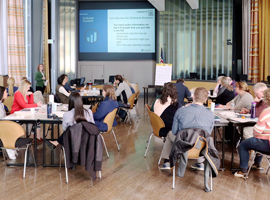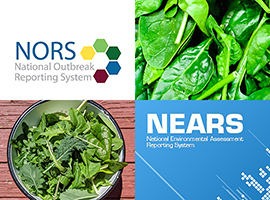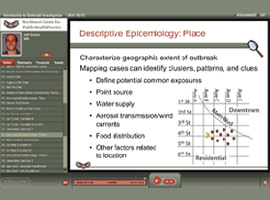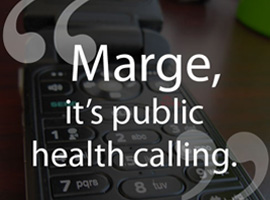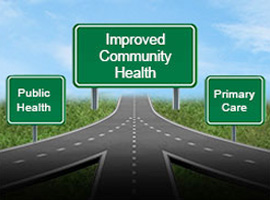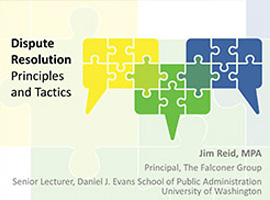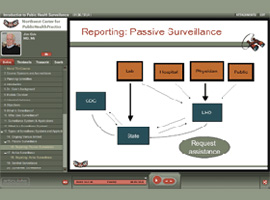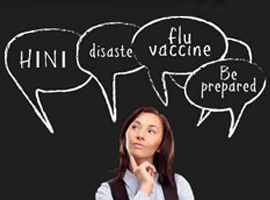Applied Outbreak Investigation
Our Applied Outbreak Investigation Training is an interactive, full-day course that teaches how to apply epidemiologic methods to foodborne outbreak investigation. This training is designed for state and local public health agency staff who may potentially work on foodborne outbreaks. It includes lectures, an interactive outbreak scenario, discussion, and optional mobile phone-based practical exercises. This course is an adapted version of a training by the same name that was developed by the Colorado Integrated Food Safety Center of Excellence.
| Topics | ||
|---|---|---|
| Epidemiology, Infectious Disease & Immunizations | ||
| Format | Time | Cost |
| In-Person | Full day | Varies |
NORS, NEARS, and the Outbreak Reporting Process
Foodborne illness outbreak reporting provides food safety programs with collaborative opportunities at the intersection of epidemiology and environmental health. This webinar will explore outbreak reporting through two CDC surveillance systems: NORS and NEARS.
| Topics | ||
|---|---|---|
| Epidemiology, Disease Reporting | ||
| Format | Time | Cost |
| Webinar | 1 hour | Free |
Diving into Vibrio
Vibriosis is a disease known to cause thousands of illnesses annually in the United States. This presentation will offer a closer look at Vibrio species and the infections they cause in humans, interviewing tips for shellfish-associated case investigations, and a look at how shellfish traceback data is used to identify outbreaks.
| Topics | ||
|---|---|---|
| Epidemiology, Infectious Disease & Immunizations | ||
| Format | Time | Cost |
| Webinar | 1 hour | Free |
Questions and Answers [PDF, 229KB]
The Role of Environmental Assessments in Outbreak Investigations
Outbreak investigations often involve a partnership between labs, epidemiologists, and food safety professionals. This presentation describes how doing an environmental assessment (not an inspection) can impact an investigation. Discovering how the outbreak occurred by determining what the contributing factors and antecedents were are also discussed.
| Topics | ||
|---|---|---|
| Epidemiology, Infectious Disease & Immunizations | ||
| Format | Time | Cost |
| Webinar | 1 hour | Free |
Introduction to Outbreak Investigation
We live in an age where disease outbreaks are commonplace. This one-hour online course outlines specific steps to take in determining if you have an outbreak on your hands, who should be involved in the investigation, the science behind it all, and how to communicate your findings to the public via the media. This is part of a nine-part series on epidemiology.
| Topics | ||
|---|---|---|
| Epidemiology, Infectious Disease & Immunizations, Law and Policy & Ethics, Program Planning & Evaluation | ||
| Format | Time | Cost |
| Online Course | 1 hour | Free |
Automated Phone Surveys in Disease Investigation
In this one hour webinar, Emergency Preparedness and Response Staff from Clark County Washington discuss the benefits and lessons learned from implementing an Emergency Community Notification System to identify potentially exposed people during several disease outbreaks.
| Topics | ||
|---|---|---|
| Epidemiology, Infectious Disease & Immunizations | ||
| Format | Time | Cost |
| Webinar | 1 hour | Free |
Bioinformatics in Public Health Genomics: A Gentle Introduction
This presentation provides a general, high-level introduction to the current state of the analysis of genomic data in public health labs in the US.
| Topics | ||
|---|---|---|
| Epidemiology, Bioinformatics, Whole Genome Sequencing (WGS) | ||
| Format | Time | Cost |
| Webinar | 1 hour | Free |
Using Next Generation Sequencing for Real Time Impact on Disease Control Options
This talk describes instances where routine, rapid sequencing informed disease control work, rather than confirming it.
| Topics | ||
|---|---|---|
| Epidemiology, Bioinformatics, Whole Genome Sequencing (WGS) | ||
| Format | Time | Cost |
| Webinar | 1 hour | Free |
Using MicrobeTrace to Integrate and Visualize Sequence and Epidemiologic Data
An overview and live demonstration of MicrobeTrace: a free, intuitive, web-based, standalone tool that can be used to integrate and explore genetic and epidemiologic data. Includes a demonstration of how MicrobeTrace was used in Washington state to investigate a multi-county outbreak of E. coli linked to pasteurized yogurt in 2021.
| Topics | ||
|---|---|---|
| Epidemiology, Bioinformatics, Whole Genome Sequencing (WGS) | ||
| Format | Time | Cost |
| Webinar | 1 hour | Free |
ATG, GAC, what can sequencing do for me?
Whole genome sequencing of enteric organisms has enhanced the ability of public health professionals to detect, investigate, and confirm outbreaks. Understanding how sequence data is generated, analyzed, and visualized makes interpreting sequence data more accessible to users outside the laboratory. This webinar will provide a high-level overview of the topic, taking learners through the sequencing process from test tube to phylogenetic trees, with a focus on why this data matters to foodborne outbreak investigators.
| Topics | ||
|---|---|---|
| Epidemiology, Bioinformatics, Whole Genome Sequencing (WGS) | ||
| Format | Time | Cost |
| Webinar | 1 hour | Free |
Incorporating NCBI’s Pathogen Detection Pipeline (PDP) into Epi Workflows
This three-part presentation includes an overview of NCBI PDP from the Centers for Disease Control and Prevention, and two live demos on using PDP for enteric investigations from Washington State Department of Health and New York State Department of Health.
| Topics | ||
|---|---|---|
| Epidemiology, Bioinformatics, Whole Genome Sequencing (WGS) | ||
| Format | Time | Cost |
| Webinar | 1 hour | Free |
Mass Gatherings: Are You Prepared?
Food poisoning at the fair, rabies exposure at the rodeo, crowd trampling at a World Cup game: what is the role of public health at events that attract large crowds? This online course teaches you to assess and plan for the prevention and mitigation of public health threats at mass gatherings. It covers topics of risk assessment, surveillance, health response, coordination, and communication. This 90-minute online course can be completed over several shorter sessions. It also includes a unique practice scenario to further enhance your learning.
| Topics | ||
|---|---|---|
| Emergency Preparedness & Disasters, Infectious Disease & Immunizations, Communication | ||
| Format | Time | Cost |
| Online course | 1.5 hours | Free |
Collaborate with Tribes: A Public Health Toolkit
Tribal nations and individual tribal members work hard to protect and promote the health of their communities. This toolkit provides an introduction to non-tribal public health professionals on how to understand this expertise and partner with tribes and tribal members.
| Topics | ||
|---|---|---|
| Cultural Competence | ||
| Format | Time | Cost |
| Toolkits and Guides | Varies | Free |
Integrating Public Health and Primary Care
Public health and primary care share a common mission to prevent disease and promote health but often work disjointedly on this shared goal. In this one hour webinar, members of the Northwest Regional Primary Care Association, Bruce Gray, MPA, and Patrick Luedtke, MD, MPH, discuss efforts to better integrate the systems at the local level.
| Topics | ||
|---|---|---|
| Leadership & Management, Law and Policy & Ethics | ||
| Format | Time | Cost |
| Webinar | 1 hour | Free |
Dispute Resolution Principles and Tactics
Efforts to "enforce laws, develop policies, and mobilize community partnerships" are essential public health services and thus require practitioners to hone their dispute resolution skills. In this one hour webinar, Jim Reid, MPA, presents a framework for collaborative negotiations and discusses how to reduce conflict and create agreements that meet the mutual needs of all parties. He also offers case examples where these techniques have been used successfully.
| Topics | ||
|---|---|---|
| Leadership & Management, Law and Policy & Ethics | ||
| Format | Time | Cost |
| Webinar | 1 hour | Free |
Introduction to Public Health Surveillance
Surveillance is a key function of public health, but what does it mean? This course introduces public health surveillance concepts and principles for public health workers who have little or no prior training in epidemiology. You'll learn about surveillance systems in local, state, and national public health practice and how these important systems are used in tracking diseases and other public health threats. This is part of a nine-part series on epidemiology.
| Topics | ||
|---|---|---|
| Epidemiology, Infectious Disease & Immunizations, Law and Policy & Ethics, Program Planning & Evaluation | ||
| Format | Time | Cost |
| Online course | 1.5 hours | Free |
Strategies for Successful Public Health Messaging
In the age of information overload, how can we encourage people to hear our messages and take action to protect their health? Who do people listen to during emergencies? How do public health agencies counter misinformation or explain complex issues? In this one hour webinar, communication specialists from Washington State explore these questions and more, addressing how audiences receive messages and what moves them toward action.
| Topics | ||
|---|---|---|
| Communication, Vulnerable Populations & Health Disparities, Emergency Preparedness & Disasters | ||
| Format | Time | Cost |
| Webinar | 1 hour | Free |
Foodborne Epidemiology: Outbreak and Investigation Review 2020
Despite the ongoing COVID-19 response, foodborne outbreaks continue to occur and require thoughtful, systematic investigation. Whether relatively new to foodborne epidemiology, assisting food safety colleagues during the COVID-19 response, or a veteran foodborne outbreak investigator, we hope that this session can serve as a helpful refresher. We will provide an update on the burden of foodborne illness, review outbreak epidemiology, discuss the key steps involved in a foodborne outbreak investigation, walk through an outbreak scenario, and more!
| Topics | ||
|---|---|---|
| Epidemiology, Infectious Disease & Immunizations, Environmental Health | ||
| Format | Time | Cost |
| Webinar | 1 hour | Free |
The “One Health” Approach to Public Health Challenges in the Pacific Northwest
In this one-hour webinar, Peter Rabinowitz, MD, MPH, discusses the “one health” framework for connecting human, animal, and environmental health to address emerging disease challenges.
| Topics | ||
|---|---|---|
| Infectious Disease & Immunizations, Environmental Health | ||
| Format | Time | Cost |
| Webinar | 1 hour | Free |
Legal Aspects of Public Health Food Safety
Food safety is a unique and critical role filled by public health agencies. In the event of a foodborne illness outbreak investigation, you may wonder what personal information is protected by privacy laws and what may be shared. You may also wonder about the source and scope of your public health authority to keep the public safe from foodborne illnesses. This 1-hour course is an introduction to legal issues that arise in public health food safety, from surveillance and outbreak investigation through restaurant inspections and detention of food.
| Topics | ||
|---|---|---|
| Law and Policy & Ethics | ||
| Format | Time | Cost |
| Online course | 1 hour | Free |

